Navigating internationally cannot be very clear. If you are involved in importing or exporting goods, understanding the roles of various regulatory bodies, such as the difference between customs and DGFT, is crucial. This is especially true regarding the difference between customs and the directorate general of foreign trade DGFT. This article will explain these two entities’ functions and how they impact your trade activities. By the end, you will have a clearer understanding, allowing you to navigate the complexities of trade more effectively.
What Are the Difference Between Customs and DGFT?
The primary difference between their functions lies in their functions. Customs collects duties and compliance primarily, while DGFT focuses on trade policies and licensing. This distinction is essential for businesses navigating international trade.
What Are Customs?
Customs report to the government agency responsible for regulating the flow of goods in and out of a country. They collect duties and taxes on imported goods and ensure compliance with various laws and regulations. Customs are vital in protecting national interests, including security and trade policies.
What Is DGFT?
The Director General of Foreign Trade DGFT is an agency under India’s Ministry of Commerce and Industry. It focuses on formulating and implementing policies related to foreign trade. BGFT also manages license issuance for importing and exporting goods, which is crucial in promoting international trade.
Why Are Customs and DGFT Important in International Trade?
Both customs are essential for ensuring smooth international trade operations. Customs focuses on text and compliance issues, while DGFT handles trade policy and licensing. Understanding their roles can help businesses avoid penalties and streamline processes.
How Do Customs Duties Work?
Custom duty is the tariff or tax on goods imported into a country. They are calculated based on the value of goods, the type of product, and its country of origin. Failure to comply with customs regulations can lead to delays and financial penalties.
How Does DGFT Impact Licensing?
DGFT issues licenses that allow businesses to import or export goods. These licenses are crucial for ensuring that products need regulatory standards. Without a proper license, your goods acted or were subjected to additional scrutiny.
Who Enforces Compliance: Customs or DGFT?
Customs is the enforcing body regarding compliance with import-export regulations. They conduct inspections, audits, and assessments. DGFT, on the other hand, sets the rules but does not directly enforce them.
When Should You Contact Customs or DGFT?
Custom is your go-to agency if you have questions about duties, taxes, or inspections. If you need information about trade policies or licensing, DGFT is the appropriate contact, and understanding this can save you time and effort.
Why Might You Need a Customs Broker or Consultant?
Navigating the complexities of customs and trade regulations can be daunting. A customs broker or consultant can help you understand your obligations, ensuring compliance and optimizing your operations. They can be invaluable for new businesses venturing into international trade.
What Are the Consequences of Noncompliance?
Failing to comply with customs regulations can result in hefty fines, place and even legal action. Noncompliance with DGFT regulations can lead to license revocation, impacting your ability to trade. This is why understanding the rules set by both entities is crucial for your business success.
How Can You Ensure Compliance with Both Customs and DGFT?
Maintaining compliance involves staying informed about regulations and procedures. Regularly review updates from both customs and DGFT. Investing in training and consulting can also be beneficial for your team.
Conclusion – Difference Between Customs and DGFT
Understanding the difference between customs and DGFT is important for anyone involved in international trade. While custom focuses on duties and compliance, TGFT handles licensing and policy formulations. Knowing when to contact each agency can save you time, money, and legal headaches. With the right knowledge and resources, you can navigate the complexities of trade more efficiently.
What Role Does Customs Play in International Trade?
Customs regulates the flow of goods and collective duties and ensures compliance with laws.
What is the Main Function of DGFT?
DGFT formulates trade policies and issues licenses for importing and exporting goods.
How Do I Know If I Need to Contact Customs or DGFT?
Contact customs for duties and inspection and DGFT for trade policies and lice.
What Happens If I Don’t Comply With Customs Regulations?
Non-compliance can result in fines, delays, and legal repercussions.
Can DGFT Revoke My Trade License?
Yes, non-compliance with DGFT regulations may lead to license revocation.
How Do Customs Duties Affect My Import Costs?
Duties increase the overall cost of imported goods, impacting your pricing strategy.
Do I Need a Customs Broker?
A customs broker can help navigate complex regulations and ensure compliance.
What Documents do I Need For Customs Clearance?
Normally, you will need shipping documents and import licenses.
Is DGFT Involved in the Export Process?
Yes, DGFT issues licenses that are required to export goods.
How Often Should I Check For Updates From Customs and DGFT?
Regularly check their official website for updates, especially before new shipments.
What Are the Benefits Of Understanding The Roles of Customs and DGFT?
It helps ensure compliance, avoid penalties, and streamline your trade operations.








